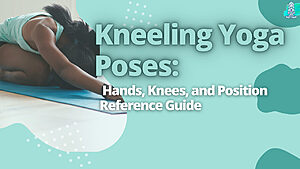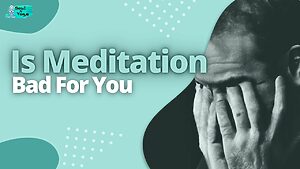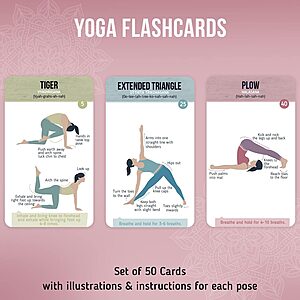Have you ever wondered how meditation can help with your studies? Well, it’s a pretty powerful tool.
Most people find it difficult to concentrate and focus on their schoolwork. This is especially true when you need to study for an important test or do some research for a paper.
In this article, I will examine the benefits of meditation and how it helps with studying.
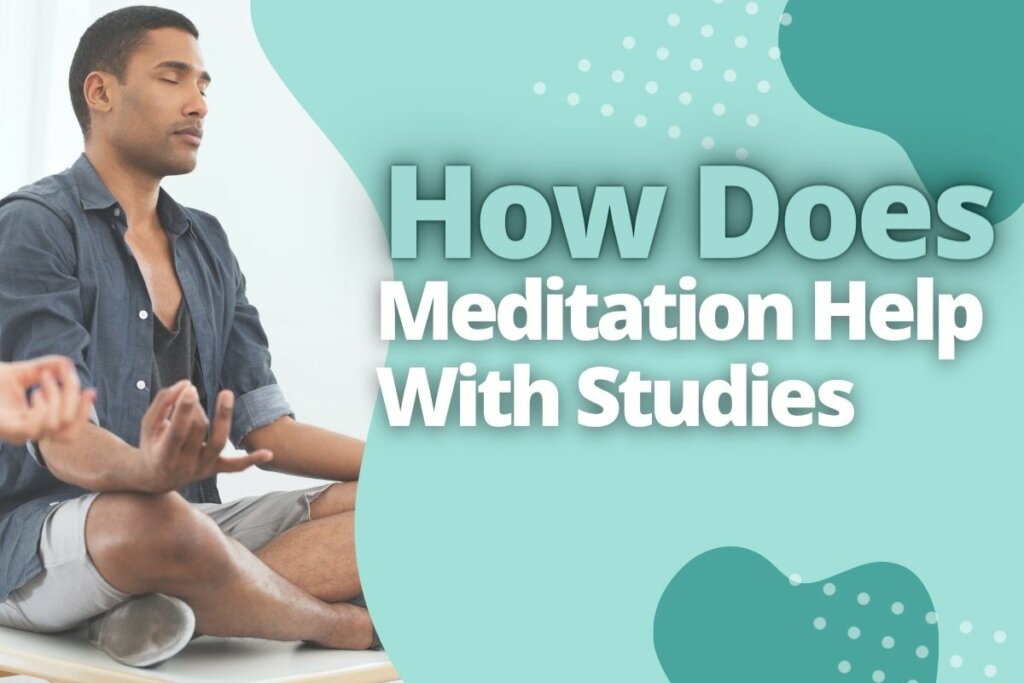
Here’s The Answer To How Does Meditation Help With Studies
Meditating helps you become more aware of your thoughts and feelings. This can help you recognize when you’re stressed, anxious, or upset, which in turn can help calm you down and relax you.
As a result, meditation may ease the symptoms of stress and anxiety. Indeed, research suggests that mindfulness meditation can improve mental health and well-being, reduce stress, and help you stay calm.
Several studies have found that meditation can help people focus and retain information. In one study published in the Journal of Clinical and Health Psychology, researchers found that meditation increased test-takers’ scores on the GRE by an average of 30 points.
Due to these and other benefits, meditation has been shown to help students of all ages with their academic and test performance.
- It helps improve your concentration and focus. In order to study effectively, you need to be able to concentrate on the task at hand without being distracted by other thoughts or activities.
- It helps reduce stress and anxiety that comes from being overwhelmed by school work and exam stressors, which will then make it easier for students to learn new things as well as retain information better than before.
How Meditation Improves Learning and Memory
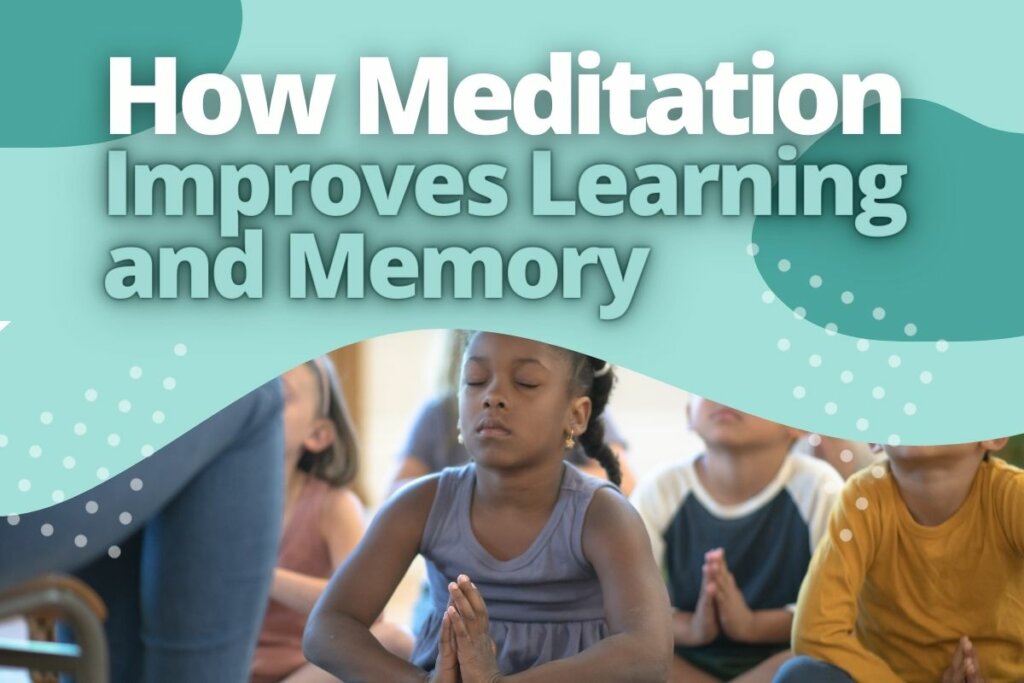
Good evidence suggests that mindfulness meditation can help people manage stress. A review of studies found that mindfulness meditation can help reduce the physical and psychological effects of stress.
Mindfulness meditation may also help people deal with stressful situations. A study of medical students found that those who practiced mindfulness meditation had lower levels of stress and anxiety during their medical exams.
- Meditation improves learning and memory.
- Students can learn better if they meditate.
- Students can remember more information if they meditate.
- Students can focus better if they meditate.
- Students can concentrate better if they meditate.
In addition to stress reduction, meditation has also been shown to improve memory and cognitive function. Meditation has also been shown to improve academic performance.
Helps with Concentration and Focus
- Meditation can help students to focus better.
- It helps to improve concentration and focus.
- Meditation helps the students in improving their mental focus; it also helps them to maintain their concentration throughout the study session and keep themselves away from distractions like social media, television, etc. Which ultimately leads to an increase in mental alertness as well as attention span.
Concentration and focus can be improved by practicing meditation, according to research.
A recent study showed that students who meditated for just 30 minutes a day had increased activity in the prefrontal cortex, the part of the brain responsible for executive function and working memory.
This is the first time that meditation has been shown to alter the structure of the brain.
Promotes Relaxation and Reduces Stress
Meditation has been shown to promote relaxation and reduce stress. It is a state of mind that can be achieved when you are able to let go of all thoughts, feelings, and emotions.
By doing this, you also release any built-up tension or anxiety in the body. When this happens, it reduces stress levels and helps you relax much better than just focusing on one thing like reading or listening to music.
When your mind is relaxed, you feel less anxious about things happening around you because there is no longer any worry about them taking place at all!
You will have a clearer head when studying because there won’t be any interference from other thoughts such as worrying about what might happen during an exam etc.
Instead, these will only serve as distractions that can cause unnecessary panic attacks before exams (which could lead to more bad grades).
Aids in Developing a Positive Attitude
Meditation and mindfulness can help you develop a positive attitude. It’s easy to focus on the negative when you’re worried about your studies, but it’s important to focus instead on the positive.
- Meditation and mindfulness will help you let go of the stress in your life so that your mind is able to concentrate more fully.
- This will lead to better studying sessions since you’ll be able to stay focused longer without getting distracted by things like anxiety or depression.
- When it comes time for exams, having an optimistic outlook can make all the difference. Studies have shown that those who look at their studies with optimism tend to do better than those who don’t.
So if you’re trying not only to learn but also to pass your classes (or even get good grades), meditation may be exactly what is needed for success!
Aids In Decision Making
Meditation is a great way to make better decisions. It helps you to make decisions in a calm state and not under pressure or stress. You can also practice meditation for a long time and still be able to make the right decision.
This is why it has become so famous in many schools, colleges, and offices around the world. Students’ decision-making has been found to benefit from meditation.
In a study of long-term meditators, it was found that they were better able to make decisions without being influenced by negative thoughts. This is good news for students who suffer from anxiety disorders or mind-wandering.
Mindfulness training has also been shown to be an effective tool for helping students make better decisions. In a study of students who received mindfulness training, it was found that they were more likely to make decisions based on compassion.
These studies suggest that meditation can be an effective aid for students in making better decisions. If you are a student who is struggling with making decisions, consider trying meditation.
Encourages a Healthy Lifestyle

Meditation helps in building a healthy lifestyle. The benefits of meditation are many, and these include better sleep, stress management, focus and concentration on studies, reduction of anxiety and depression symptoms, decrease in headaches and migraines as well as improvement of memory recall ability.
This may be due to decreased cortisol levels after meditating which affects our moods by altering the way we process emotions like fear or anger—both negative feelings we don’t want when studying!
Mindfulness practices, such as meditation, have also been shown to improve physical health. Complementary and alternative medicine practices, such as meditation, are becoming more popular among college students.
Increases Creativity
Meditation can help you to be more creative in general. If you are a person who likes to meditate, then you should know that it can help your creativity as well. In fact, meditation can improve your ability to think creatively and develop new ideas.
Meditation helps people become more open-minded, feel less stressed out about their work, and focus better on things that require creativity.
In addition to this, meditation also encourages individuals to think outside the box continuously so that they can find innovative ways of solving problems related to their work or studies (or any other thing).
Teaches Mindfulness
Meditation teaches you to be mindful. Mindfulness is the practice of paying attention on purpose, in the present moment, and non-judgmentally.
When you are mindful, you are able to focus your awareness on what is going on right now without letting your thoughts wander off into other areas.
The benefits of being mindful include higher levels of concentration and productivity, less stress; greater ability to pay attention which leads to improved memory recall; lower anxiety levels; a greater sense of well-being overall.
Benefits Of Regular Meditations For Students
Reduces Stress: As a student, you’re under a lot of stress, which makes it tough to focus on your academics.
Meditation helps reduce stress by allowing you to clear your mind and relax. By reducing stress, you will be able to think more clearly and be more productive when it comes to studying.
Improves Concentration: Students often struggle with concentrating when studying for long periods of time, especially if the subject matter is difficult or boring.
If you practice meditation regularly, however, you will find that your ability to concentrate improves significantly over time as a result of becoming more relaxed during meditation sessions (which makes sense).
How To Meditate Effectively As Students
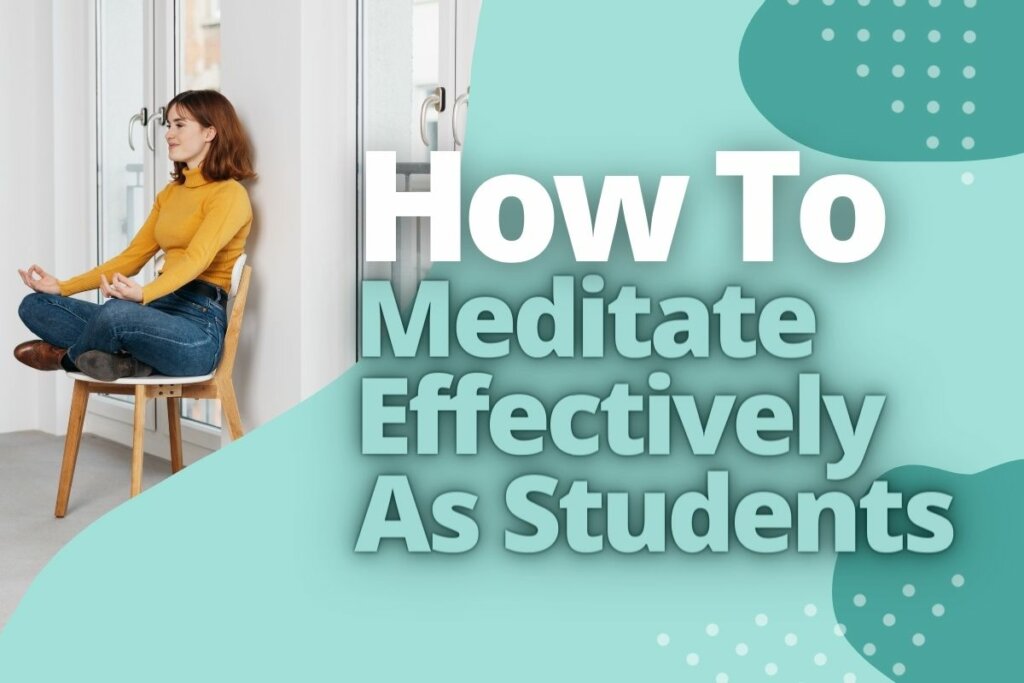
Students today face more pressure than ever before. With the demands of school, extracurricular activities, and social pressures, it’s no wonder that so many students feel stressed out. One way to help manage stress is to meditate.
Here are some tips for how to meditate effectively as a student:
- Find a quiet place to sit or recline. You don’t need to be in a special posture to meditate. Just make sure you’re comfortable.
- Close your eyes and focus on your breath. As you breathe in and out, try to focus your attention on the sensation of your breath. Bringing your attention back to your breath is a simple way to keep your mind focused.
- Don’t worry about doing it perfectly. The goal of meditation is not to clear your mind completely but simply to focus on the present moment. If your mind does wander, that’s okay. Bring your attention softly back to your breathing.
- Start with a few minutes each day. Meditation can have a favorable effect even if you only spend a few minutes a day doing it. Every little bit helps. Daily meditation for just a few minutes has the potential to be beneficial.
- Be patient. Meditation takes practice, so don’t expect to be a master meditator overnight. Just keep at it, and you’ll see improvements over time.
How Can Students Benefit From Using Meditation?
Meditation has been proven to be an effective technique for improving focus, concentration, and memory. It can also help you reduce stress and anxiety.
It’s also a good way to improve your creativity. Meditation is said to be helpful in improving self-awareness too.
This means that it helps you become more aware of your thoughts, feelings, and behaviors, which lead you towards better decision-making skills as well as healthier lifestyle choices such as eating healthy food or exercising regularly.
Finally, meditation helps with sleep if done regularly before bedtime so that you’ll sleep better at night!
What Are The Risks When Studying With A Distracted Mind?
The main risk of studying with a distracted mind is that you will do poorly in exams. Poor performance in exams can lead to poor grades, which means that you might not get into graduate school or get your dream job.
If this happens, it could affect the rest of your life. Poor memory is another risk of studying with a distracted mind.
Another risk associated with having an unfocused mental state while learning new information is poor concentration levels which leads directly back into our discussion on memory recall issues from earlier on in this article!
How Do Students Use Meditation?
It is possible to meditate at any time and in any place. It does not require any special equipment or materials and can be done alone or in groups. In addition to a few minutes each day, meditation can also be performed for up to one hour every day.
You may choose to sit in a chair or on the floor (cross-legged or in lotus position), lie down (on your back or side), do yoga poses, walk around the room, etc., depending on what works best for you.
How Can Meditation Help Students To Focus Better And Study Longer?
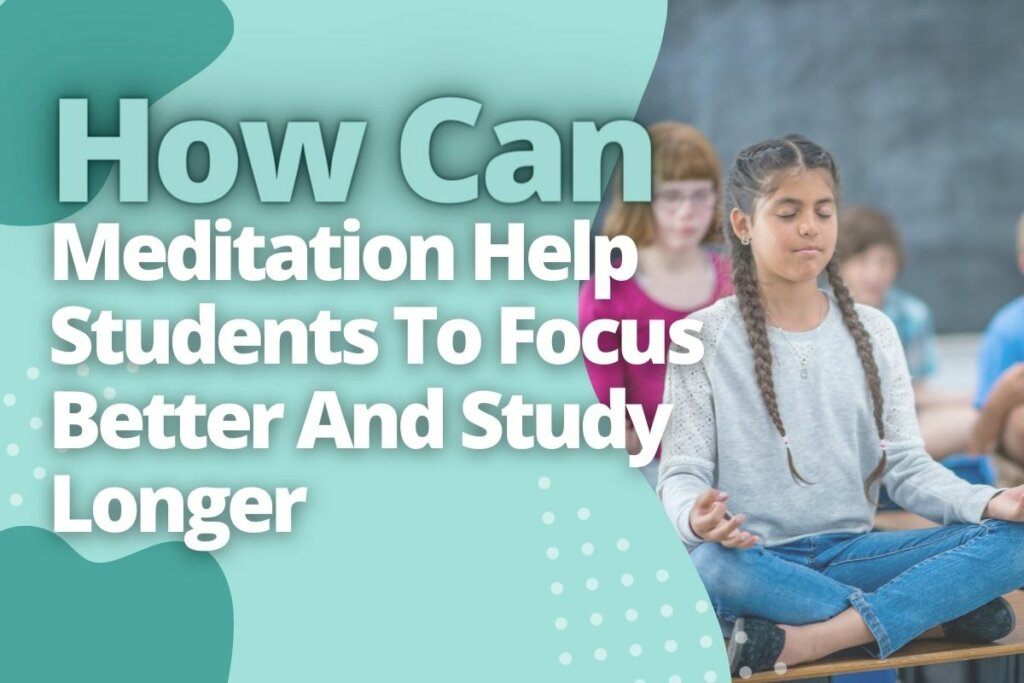
Meditation can help with focus, study time, learning, and sleep. Meditation helps students to focus better by helping them to relax their minds before they go into studying.
It also helps students to learn better by allowing their minds to get clearer and sharper as they are doing their work. Meditation also helps students sleep better at night because it helps them relax more than usual before going to bed.
Conclusion
In this blog post, we discussed the benefits of meditation for studying. We explained that meditation helps with concentration and focus, as well as the ability to block out distractions and reduce stress.
Meditation teaches students how to clear their minds, which is one of the most common distractions when studying. Meditation also provides a sense of calmness and peace that can help with stress levels.
This means less stress during study time and more focus on what’s being learned instead! If you are studying and struggling with your studies, try meditating. It is proven to benefit concentration and focus.
Thank you for reading this blog post! For more great content, keep following our website for new topic updates!
Frequently Asked Questions
What are some distractions that keep students from meditating?
Distractions like phone notifications, family, and friends are just a few of the many distractions that keep students from meditating. What’s more, some students feel uncomfortable with the thought of sitting still for an extended period of time.
What are some tips for starting to meditate as a student?
Meditation is a way to calm your mind and body, so it’s a good practice for students! Try taking 5–10 minutes each day to sit quietly and meditate. You could sit on the floor or in a chair. It’s best to sit upright with your back flat against the surface. Meditation isn’t about having a blank mind; it’s about being present and aware of what’s happening in your body, thoughts, and surroundings. If you find your mind wandering, gently bring it back to what you’re sensing at that moment.
Is there a recommended age for learning to meditate?
Research suggests that meditation is safe for children, with the exception of those with a clinical diagnosis of anxiety or depression. However, the American Academy of Pediatrics recommends that children should learn about meditation and mindfulness from their parents, not from school or outside programs (the academy).
Does meditation have any negative effects on your brain or body if you do it incorrectly?
Research suggests that meditation can have a number of benefits, including reduced stress and anxiety, improved sleep, and enhanced body awareness. However, there are some potential health risks associated with poor or improper posture while meditating, such as back pain and muscle soreness.
My name is Mugen Seki, and I’m a painter and yoga enthusiast who is passionate about bringing together art and exercise in ways that help people connect with their inner selves. When I’m not painting, I’m practicing yoga. And when I’m not doing either of those things, I’m usually thinking about them.
- How to Hold a Yoga Pose for 4 to 5 Minutes – Practical Tips
- A Guide to Finding the Perfect Yoga Mat for Carpet Floors
- Kneeling Yoga Poses: Hands, Knees, and Position Reference Guide
- Is Meditation Bad For Christians (The Surprising Answer)
- Is Meditation Bad For You (Don’t Believe Everything)
- Will I Get Better At Meditation (Understand The Secret)




